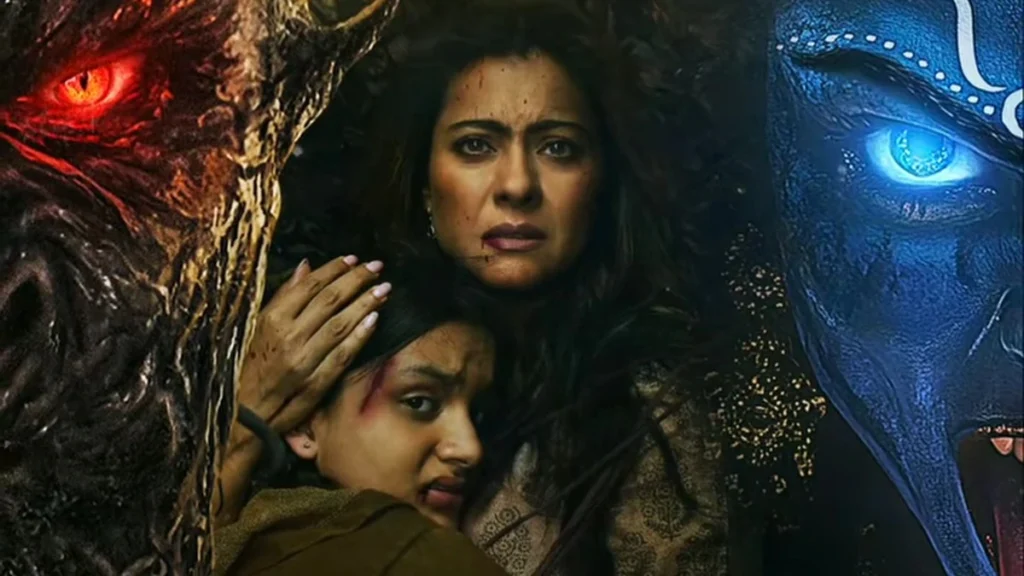Maa Movie Review: The Modern Mother as a Mythical Warrior
There’s a saying in Indian households: “Don’t test a mother’s strength; her power knows no bounds.” This sentiment is the spine of Maa, a supernatural thriller that fuses age-old folklore with modern anxieties. Anchored by a compelling performance from Kajol, the film dares to pit a contemporary mother against ancient, malevolent forces—but the storytelling doesn’t always live up to its ambitions.
Set against the eerie stillness of Bengal’s countryside, Maa tells a story that feels both familiar and hauntingly original. At its core, this is a tale of a mother protecting her daughter—but the layers of mythology, generational trauma, and feminine rage give it an intriguing texture.
Plot Summary: Between Shadows and Secrets
Ambika (Kajol) and her husband Shuvankar (Indraneil Sengupta) live a relatively peaceful life, keeping their daughter Shweta (Kherin Sharma), a sensitive and artistic 12-year-old, blissfully unaware of the family’s troubled lineage. But when a tragic event triggers questions that can no longer be silenced, mother and daughter journey back to Chandrapur—a place wrapped in silence, shadows, and stories best left buried.
The family’s ancestral haveli, nestled in the heart of a dense forest, is managed by the ever-watchful Joydev (Ronit Roy), whose quiet demeanor masks decades of unspoken truths. Also present is the mute and mysterious old caretaker (Dibyendu Bhattacharya), whose vacant eyes seem to hold all the answers.
What follows is a descent into horror—not just supernatural, but societal. The past unravels to reveal crimes so dark, they echo into the present. Newborn girls murdered in the name of tradition. A demon named Raktbeej, who thrives on violence and rebirth. A curse that still lingers, clawing through time.
Themes That Matter: Feminism, Folklore, and Fear
What Maa attempts is bold and worthy of attention. It uses horror not just for jump scares, but to critique patriarchy in its most violent form. The narrative takes a strong feminist stance—showing Ambika’s transformation from an anxious mother to a warrior goddess invoking the power of Kali.
There’s a particularly moving moment when menstruation—a topic still taboo in many Indian homes—is discussed naturally between mother and daughter. It’s this quiet revolution, not the visual spectacle, that leaves a lasting impression.
Additionally, the film’s setting adds depth. The Bengal landscape—with its gnarled trees, misty air, and red-and-white Kali Puja celebrations—feels alive. It’s a cinematic space where past and present bleed into each other.

Performances: Kajol Commands the Screen
Kajol delivers a performance marked by depth and dignity. She portrays Ambika not as a typical “heroine,” but as a layered woman caught between logic and legend. Her transition from protective parent to divine avenger is the emotional and symbolic arc the film hinges on.
Ronit Roy as Joydev brings a brooding stability to the chaotic storyline. His presence provides gravitas, especially in scenes where silence says more than dialogue ever could. Kherin Sharma, as Shweta, impresses with her vulnerability, though her character could have benefited from sharper writing.
Visuals and Technical Execution: A Mixed Bag
The production design is visually rich. Saturated colors, symbolic motifs, and the forest surrounding the haveli create an unsettling atmosphere. The cinematography occasionally shines, especially during the Kali Puja sequences where dancers in traditional attire stir both beauty and dread.
However, the CGI feels dated and uninspired. The demon Raktbeej, though pivotal to the plot, lacks menace due to lackluster effects. In a film that leans so heavily on the supernatural, believable visuals are non-negotiable—and that’s where Maa stumbles.
The Screenplay: Where the Magic Falters
For all its noble intentions and thematic heft, the writing is Maa’s weakest link. The first half meanders, setting up characters without urgency. The second half rushes through crucial developments, leaving arcs undercooked and emotional payoffs diluted.
The final showdown—where Ambika channels Kali to confront Raktbeej—should have been electrifying. Instead, it’s weighed down by clunky exposition and a lack of narrative clarity. The balance between myth and modernity isn’t achieved as smoothly as the premise promises.
Why Maa Still Deserves Attention
Despite its flaws, Maa is a rare film that tries to marry myth with meaning. It’s not just about demons in the dark—it’s about the societal demons women have fought for generations. It’s about reclaiming sacred narratives for female empowerment. And it’s about telling daughters that their stories are worth fighting for.
Kajol’s performance alone makes the film watchable. She carries the emotional weight with ease, and her presence lends authenticity to even the most exaggerated scenes.
Final Verdict: A Powerful Idea Lost in Translation
Maa is a film with a voice—and an important one at that. It explores the complexities of motherhood, the burden of generational trauma, and the haunting echoes of patriarchal violence. While the execution falters in parts, the film’s core message remains strong: A mother’s strength is mythical, not metaphorical.
Rating: 3 out of 5 stars


